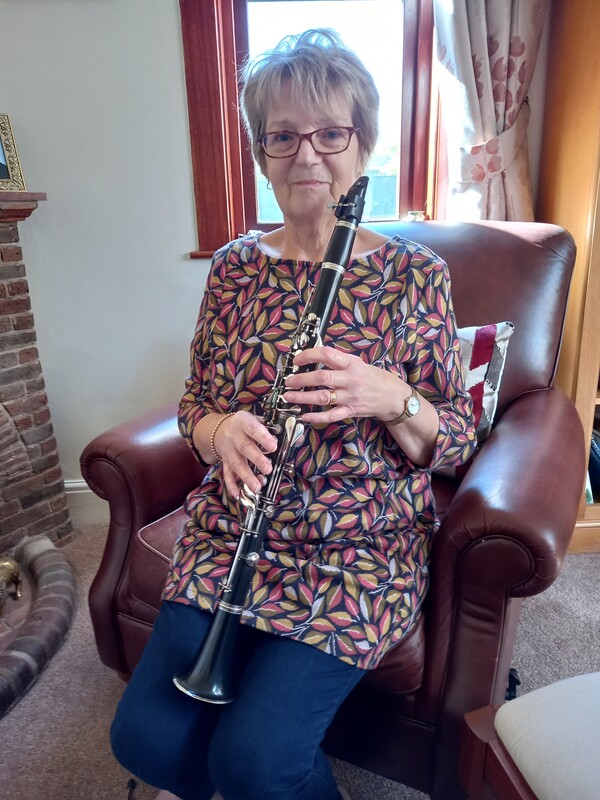Case study: Playing a woodwind instrument despite rheumatoid arthritisThe story of Louise Parry
|
Retiree Louise Parry lives with the autoimmune disease, rheumatoid arthritis. It’s a condition that she first developed at the age of 40. As the condition has got progressively worse over the last thirty years, Louise has adapted her life accordingly.
Here Louise recounts how her adapted clarinet means she can continue making music.
“Although only an amateur musician, my love of playing music is such an important part of my life. It is a passion that rheumatoid arthritis has sought to diminish. To some extent, it has achieved that. There are certainly things I can no longer do, for example, I’ve had to give up playing the piano and classical guitar. It seemed the same would apply to my clarinet – which I first took up some twenty years ago – but with the help of a friend, we found a workable alternative which meant I could continue playing.
We approached a musical instrument repairer, Alex Preston, who introduced me to Daniel Bangham of Cambridge Woodwind Makers and his friend and colleague, Peter Worrell.
Both are renowned instrument makers, with Peter’s specialism the one-handed clarinet. His instrument – handsome though it is – is not compatible with my condition due to its weight. What I needed instead was an adaptation of my own clarinet.
The process was a relatively straightforward one. I visited Cambridge and stood in front of Daniel, holding the clarinet with my fingers in the most comfortable position. He set about drawing diagrams. Six weeks later, Peter had finished worked on my clarinet. He covered all the holes and moved up the bottom pieces and thumb rest so that it was perfectly adapted to suit my fingering. In fact, one of the covered holes had a little lever extension put in place to accommodate my right index finger!
When the National Rheumatoid Arthritis Society asked its members ‘what’s the best thing you’ve ever done?’ the answer was very clear for me. It was finding a way to continue playing the clarinet.
My condition is, as you would expect, painful. It is distressing that my elbows won’t straighten and that the joints in my hand are starting to fuse. I find that playing the clarinet most days helps to keep my joints working. It may now involve playing with the middle joint of my right hand but I’m a firm believer in never giving up!
To anyone facing a progressive disease that affects the strength and dexterity in their hands, my advice is simply this: it is certainly not the end as far as playing a woodwind instrument is concerned. There will be people and organisations out there who can help tailor a solution for you.
I now play in three groups, the largest being Coventry Arts which brings together saxophone, flute and clarinet players every month. We don’t charge for our biannual concerts but request donations for our charity of choice. I’m delighted that OHMI was the charity benefiting from our Summer concert. It means so many others – whatever disability they’re facing – can receive help to access the instruments they need.”
Louise demonstrating her adapted clarinet:
https://youtu.be/XwQTo6vW1c8
“Although only an amateur musician, my love of playing music is such an important part of my life. It is a passion that rheumatoid arthritis has sought to diminish. To some extent, it has achieved that. There are certainly things I can no longer do, for example, I’ve had to give up playing the piano and classical guitar. It seemed the same would apply to my clarinet – which I first took up some twenty years ago – but with the help of a friend, we found a workable alternative which meant I could continue playing.
We approached a musical instrument repairer, Alex Preston, who introduced me to Daniel Bangham of Cambridge Woodwind Makers and his friend and colleague, Peter Worrell.
Both are renowned instrument makers, with Peter’s specialism the one-handed clarinet. His instrument – handsome though it is – is not compatible with my condition due to its weight. What I needed instead was an adaptation of my own clarinet.
The process was a relatively straightforward one. I visited Cambridge and stood in front of Daniel, holding the clarinet with my fingers in the most comfortable position. He set about drawing diagrams. Six weeks later, Peter had finished worked on my clarinet. He covered all the holes and moved up the bottom pieces and thumb rest so that it was perfectly adapted to suit my fingering. In fact, one of the covered holes had a little lever extension put in place to accommodate my right index finger!
When the National Rheumatoid Arthritis Society asked its members ‘what’s the best thing you’ve ever done?’ the answer was very clear for me. It was finding a way to continue playing the clarinet.
My condition is, as you would expect, painful. It is distressing that my elbows won’t straighten and that the joints in my hand are starting to fuse. I find that playing the clarinet most days helps to keep my joints working. It may now involve playing with the middle joint of my right hand but I’m a firm believer in never giving up!
To anyone facing a progressive disease that affects the strength and dexterity in their hands, my advice is simply this: it is certainly not the end as far as playing a woodwind instrument is concerned. There will be people and organisations out there who can help tailor a solution for you.
I now play in three groups, the largest being Coventry Arts which brings together saxophone, flute and clarinet players every month. We don’t charge for our biannual concerts but request donations for our charity of choice. I’m delighted that OHMI was the charity benefiting from our Summer concert. It means so many others – whatever disability they’re facing – can receive help to access the instruments they need.”
Louise demonstrating her adapted clarinet:
https://youtu.be/XwQTo6vW1c8
I find that playing the clarinet most days helps to keep my joints working. It may now involve playing with the middle joint of my right hand but I am a firm believer in never giving up!
Donate to OHMIThere are so many disabled people who are desperate to play music with their peers. We can help to make that happen – but we can only do that with the wonderful support of our funders and donors.
As our instruments have to be hand-made by experts, they can only be produced in small numbers and are therefore expensive. Every little really does help.
|
Contact usIf you have a query or wish to contact us, please use the contact form available here.
You can also write to us: The OHMI Trust, 29 Woodbourne Road, Harborne, Birmingham B17 8BY |
Subscribe to our NewsletterIf you would like to join our mailing list and keep up to date with the latest news, please complete the form available here.
|
Privacy and Cookies Notice | Complaints Policy
All content © OHMI - Enabling Music-Making for Physically Disabled People
The OHMI Trust is a registered charity (Registered in England and Wales Charity No. 1143623, Scotland Charity No. SC052047).
Registered office: 29 Woodbourne Road, Harborne, Birmingham, B17 8BY
All content © OHMI - Enabling Music-Making for Physically Disabled People
The OHMI Trust is a registered charity (Registered in England and Wales Charity No. 1143623, Scotland Charity No. SC052047).
Registered office: 29 Woodbourne Road, Harborne, Birmingham, B17 8BY





